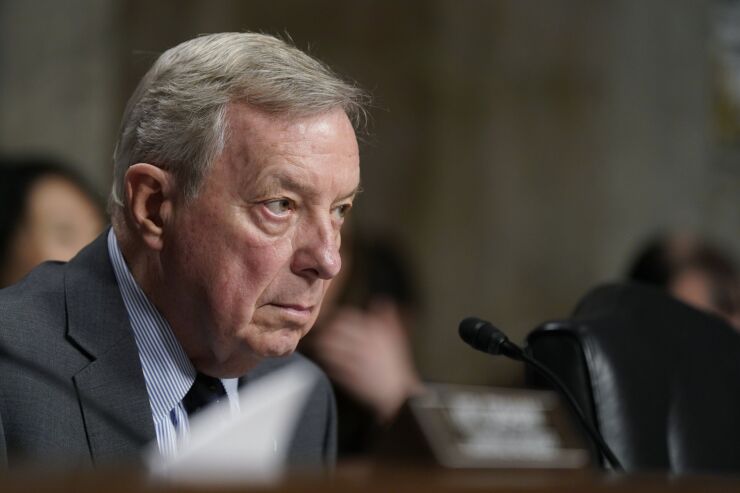
WASHINGTON — Sen. Dick Durbin, D-Ill., the second-highest-ranking Democrat in the Senate and a fixture of Capitol Hill since the early 1980s, announced Tuesday he will not seek reelection in 2026, closing out a legislative career that has
Durbin, 80, has long used his perch on the Senate Judiciary Committee and in Democratic leadership to champion progressive causes. But he may be best remembered within financial policy circles for his efforts to overhaul the payment card industry — first with the Durbin Amendment, a controversial provision of the 2010 Dodd-Frank Wall Street Reform and Consumer Protection Act, and more recently through
The bill would require banks with more than $100 billion in assets to offer retailers the choice between two unaffiliated card networks, one of which cannot be Visa or Mastercard.
"By forcing Visa and Mastercard to actually compete for merchants' business, we're aiming to end the cycle of increasing interchange fees that's breaking the backs of small businesses," Durbin said on the Senate floor last year. "And as you can imagine, Visa, Mastercard, and their big bank partners don't like our bill."
The legislation has indeed faced consistent criticism from bank and payments groups. Despite that pushback, Durbin managed to attach a number of bipartisan cosponsors, particularly his main Republican counterpart on the bill, Sen. Roger Marshall of Kansas.
The CCCA has lingered in Congress for years and picked up bipartisan cosponsors, including now-Vice President JD Vance when he was a Republican senator from Ohio. Durbin was expected to reintroduce the bill this Congress, but has not yet done so.
The legislation hasn't made any gains for months, however, despite multiple opportunities to attach it to must-pass funding bills last year. It did receive a
Even lawmakers like Sen. Thom Tillis, R-N.C., who is traditionally friendly toward the banking industry, emphasized the need to revisit swipe fees. But he added that this specific legislation would not be the best way to remedy the situation.
"We have a problem here," Tillis said at the hearing. "You've got a Congress and a half to solve this problem, in my estimation. Get in a room and solve it."
Durbin's lasting legacy may be the so-called
Durbin's retirement sets off a rare competitive race in Illinois, a solidly blue state, and in Democratic senior leadership. His departure will also represent a generational shift in Congress, as a number of older senators who've dominated the upper chamber for decades announce that they are stepping down, making way for younger politicians.
"The decision of whether to run for re-election has not been easy," Durbin said in a video announcing his retirement. "I truly love the job of being a United States senator. But in my heart, I know it's time to pass the torch."
Sen. Brian Schatz, D-Hawaii, 52, and a former member of the Senate Banking Committee, is widely seen as a successor to Democratic leadership after Durbin's departure.






